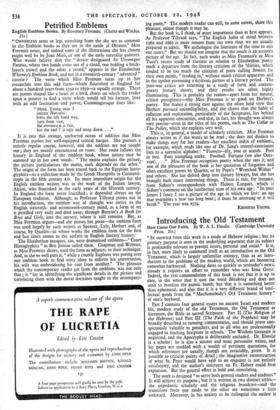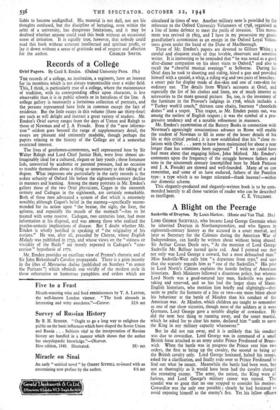Introducing the Old Testament
How Came Our Faith. By W. A. L. Elmslie. (Cambridge University Press. 21s.)
" IN outward form this work is a study of Hebrew religion ; but its primary purpose is seen in the underlying argument that its subject is profoundly relevant to present issues, personal and social." It is, in fact, more likely to commend itself as an introduction to the Old Testament, which is largely unfamiliar country, than as an intro- duction to the problems of the modern world, which are becoming somewhat hackneyed. Nothing dates so quickly as yesterday's news; already it requires an effort to remember who was Irma Grese. Indeed, the real commendation of this book is not that it is up to date, in the sense that it uses the word Blitzkrieg and does not omit to mention the atomic bomb, but that it is something better than ephemeral, and also that it is a very different brand of intel- lectual goods from the " 1ViacSomebody's Old Testament history " of one's boyhood.
pftrt I contains four general essays on ancient Israel and modern life, modern study of the old Testament, the Old Testament as literature, the Bible as sacred Scripture. Part II (The Religion of the Hebrews) and Part III (The Faith of the Prophets) may be broadly described as running commentaries, and should prove con- spicuously valuable to preachers and to all who are professionally engaged in teaching Scripture in schools. The Wisdom literature is neglected, and the Apocrypha is deliberately excluded. Dr. Elmslie is a scholar: he is also a sincere and most persuasive writer, and his pages are studded with a wealth of pertinent quotations, for which references are usually, though not invariably, given. It is possible to criticise points of detail ; the imaginative reconstruction of what St. Peter would have said to an enquirer is not entirely satisfactory, and the author's strictures on Fr. Hebert could bear expansion. But the general effect is bold and stimulating.
The work is designed " to serve both general readers and students." It will achieve its purpose ; but it is written in two distinct styles— the unpedantic scholarly and the religious broadcast—and the transitions from one mode to the other are sometimes a little awkward. Moreover, in his anxiety to be colloquial the author is
liable to become undignified. His material is not dull, nor are his thoughts confused, but the discipline of lecturing, even within the orbit of a university, has dangerous limitations, and it may be doubted whether anyone could read this book without an occasional sense of irritation. It is equally true, however, that nobody could read this book without constant intellectual and spiritual profit, or lay it down without a sense of gratitude and of respect and affection



































 Previous page
Previous page